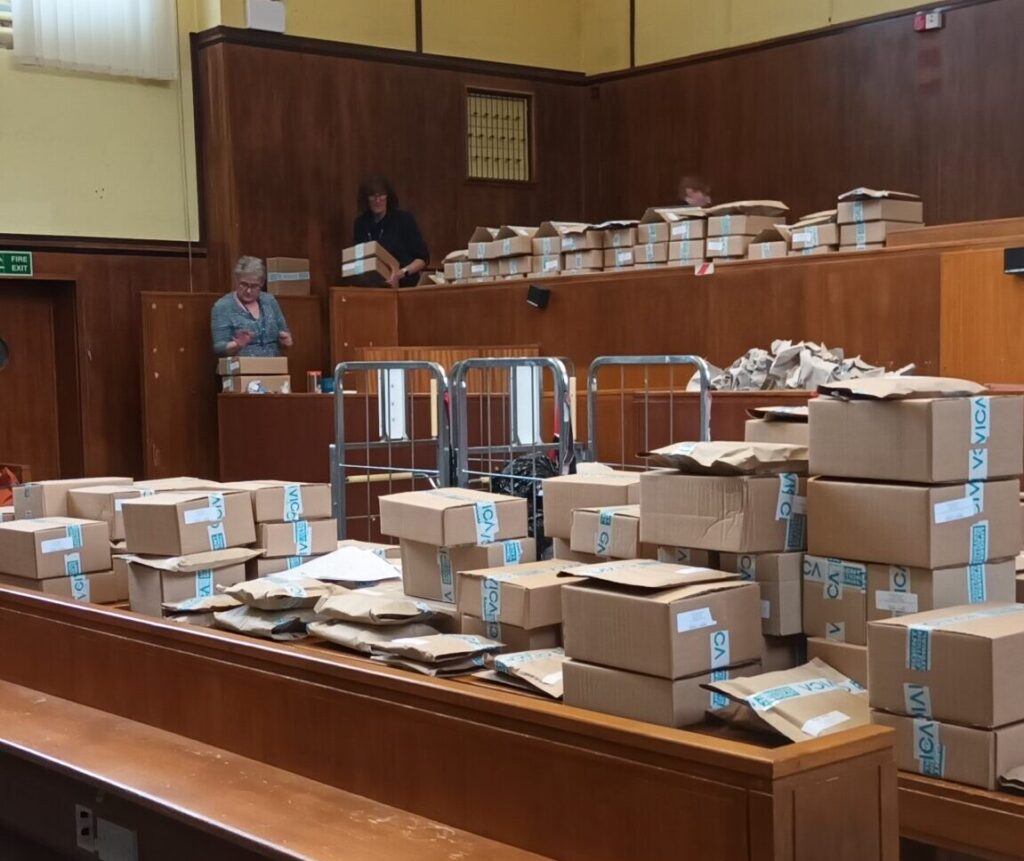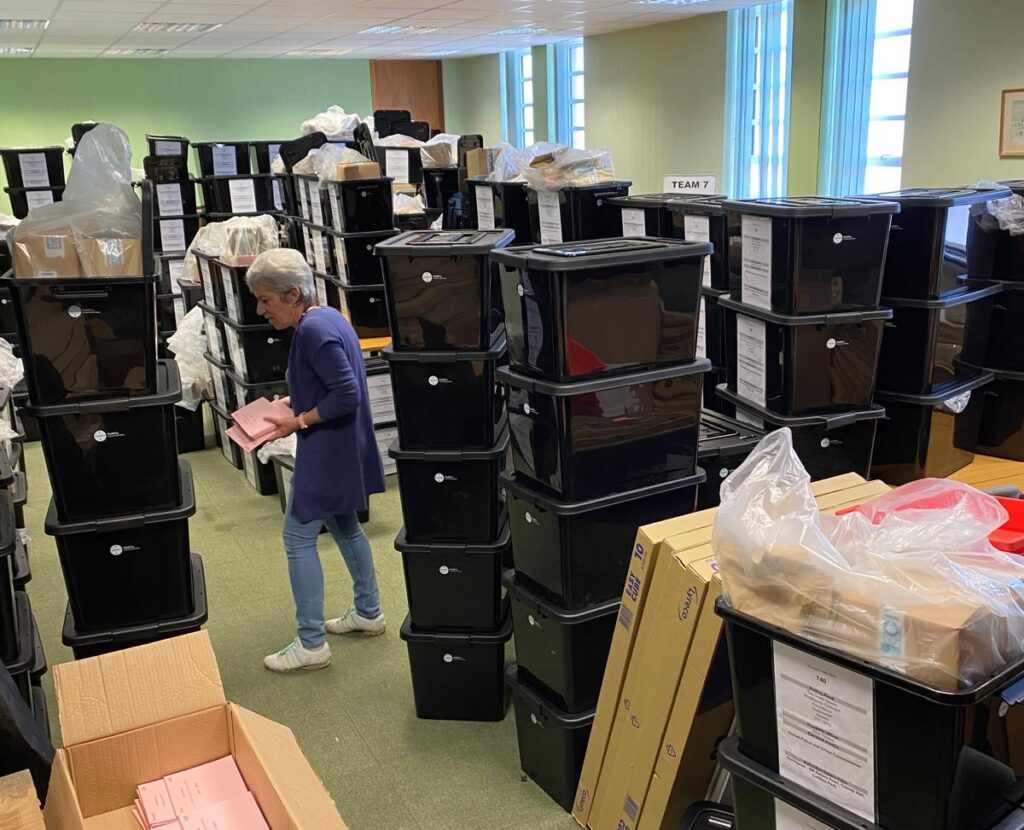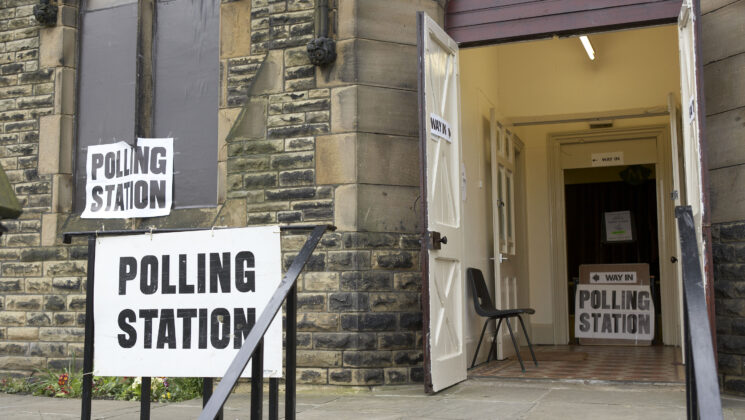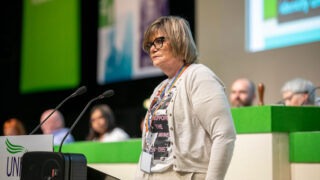At about 5:15pm on Wednesday 22 May, the prime minister, standing outside 10 Downing Street, announced that there would be a general election on the 4 July.
There isn’t a big red button at Dorset Council, but if there was, I like to imagine someone in the democratic and electoral services (DES) team would have pressed it shortly afterwards. Instead, someone reached up to the top shelf and dusted off the ‘project plan’ for a general election.
By 8am the next morning, barely a working hour later, the team had sent emails to 307 polling station venues and over 1,200 staff registered on their database to check their availability for the first Thursday in July, six weeks to the day.
Before then, the team would have to:
- Publish the required legal notices at key stages throughout the election
- Process the huge uptick in voter registrations and applications for postal or proxy votes
- Receive nominations for candidates, process them and publish candidate lists
- Print somewhere in the region of 300,000 bespoke poll cards (and post them) and the same number of ballot papers and postal vote ballots
- Book and fit out over 300 polling stations with tables, chairs, accessibility ramps, pens, pencils, serialised ballot papers, voter lists, signs and more
- Organise and deliver the counting of votes – including arranging a team to count and verify the 50,000 postal votes
- Employ over 1,200 staff to work at the polling stations and the counts
- Train those staff
- Ensure that all of these things, and more, are completed with complete transparency, impartiality and accessibility.
All of this must be able to be put into action within the statutory minimum of 25 working days for a snap election – though this year: “I think we had the luxury of 30 working days,” says Jacqui Andrews, services manager for the DES team at Dorset Council.
She continues: “On the face of it, elections seem simple – give someone a ballot paper and they vote, they put it in the ballot box and then it gets counted. But I can honestly say that when colleagues, who have no previous experience of elections, see what is involved, they are always astounded.”

Jacqui Andrews
The team
As services manager, Jacqui provides strategic direction for the joint DES team of 25 staff and during county-wide or national elections she takes a more operational role, overseeing the delivery of elections. While Jacqui’s team is joint, there are two distinct but overlapping functions.
Democratic services support the day-to-day running of the council’s decision-making processes and governance structures. Organising council meetings and supporting the elected members with the knowledge and skills to make informed decisions, as well as ensuring transparent, accessible processes and encouraging appropriate public participation.
Meanwhile the focus of this article, election services – a team of 10 in Dorset, are a statutory function to administer accessible and effective elections and referenda. The team also aims to increase public awareness of local democracy and maximise voter turnout through digital registration and communications around issues like voter registration and voter authority certificates due to the new ID requirements.
But ensuring accessibility and promoting participation is as far as it extends. As Jacqui explains: “Political neutrality is an absolute must. The discussion of political beliefs is out of the question and colleagues are mindful not to share any political material or the frequent jokey social media posts that are often prevalent in the lead up to an election.
“Obviously the team have the democratic right to vote, but that’s as far as it goes.”
It’s only once every five years
A general election is certainly a crunch point for teams like Jacqui’s, but it’s not all kicking back and putting your feet up the rest of the time.
Throughout the year, the team is also responsible for maintaining the electoral register. This includes the annual canvas where they write to approximately 187,000 households to check the correct people are registered at each address and administering the thousands of register changes made each year. And they also continuously monitoring and reviewing governance arrangements like boundaries and councillor numbers.
Furthermore, they constantly review polling districts and polling stations, trying to visit all 307 polling stations at least once every five years to ensure they are accessible and suitable.
Jacqui says: “It is really important for us to ensure that everyone who wishes to exercise their right to vote is able to do so. It’s often a challenge in rural areas where there may be only one venue that we can use, like a village hall, that was built many years ago with steps at the entrance or poor lighting outside.”
The team fits out each station with whatever is necessary – ramps, additional lighting, traffic cones demarcating new disabled parking spaces and even doorbells outside polling stations so that voters who need assistance can call staff to the door.
Besides the review process and preparations, as Jacqui points out: “There is almost always an election underway somewhere in the county.
“We have 155 parish councils, with over 1,400 parish councillors. If a local councillor resigns or passes away this creates a vacancy, but unless you live in a particular village you wouldn’t know that the election is taking place.”
And that’s not to mention the more complex county-wide local elections and by-elections.

The team taking whatever space is on offer
Surprise! Election time
Jacqui continues: “When we have scheduled elections, the work starts around 12 months in advance, contacting polling stations and staff for availability, with certainty of the date. We can also start printing off polling station materials well in advance because we know the date which has to be printed on them.
But for a snap election: “We don’t know any earlier than anyone else, and generally hear through the ‘breaking news’ ping on our phones. We have the project plan sitting on a shelf ready to roll out, but there is very little we can do in advance to prepare.”
The same work has to be done for a ‘snap’ as for an election with over a year’s notice – and more on top. Overnight after the general election was called, the team received around 1,000 new registration and postal vote applications. Then through the day, responses from the 8am emails start coming in.
“We find that venues we usually use have bookings for election day, sometimes these can be changed but, if not, we have to find alternatives – which isn’t an easy task in rural areas.”
The same is true of staff, while they have a cohort ready and willing on file: “Some of the staff who help us at the polling stations and the count already have plans, or are away on holiday, so there’s a mad scramble to plug the gaps.”
Because most of the election materials need to contain dates, candidate names, or other details not available until the election, they can be prepared but can’t be printed. “So, we end up monopolising the photocopiers and any spare space in the offices to prepare and collate polling resources and equipment.”
There’s an old saying that ‘no plan survives contact with the enemy’ and even with the project plan coming off the shelf, cramming such a huge amount of work into such a short space of time needs dedication, commitment and “…our main trick, drinking lots of tea and eating lots of cake,” says Jacqui.
“For the May local elections – and we anticipate similar figures for the general election – the election team used around 4,000 teabags, ate around 100 bacon sarnies, and had too many biscuits to admit in the eight weeks leading up to the election. Though the team did also walk the equivalent of 17 marathons in the final seven days, so we don’t feel too bad about the extra calories.”

Preparations in full-swing
Full-council effort
Jacqui is quick to point out that on top of her team’s hard work, the county-wide and national elections are a full-council effort: “The delivery of a parliamentary election in such a short space of time is a mammoth project and at Dorset Council we are very lucky to have really supportive colleagues.
“I had numerous messages the day after the announcement of the parliamentary election with offers of ‘call if we can help’.”
She notes the range of teams that get involved: “From facilities moving the elections team into a space that can be secured to ensure the secrecy of the ballot – and the teams that temporarily moved out of their work area to allow us to ‘take over’.”
As Jacqui explains, “Secrecy of the ballot is a firm requirement” – both in terms of information on who is running for election as well as in opening postal votes – “So the rooms where this is happening have to be tightly controlled.”
She goes on to highlight their comms team that deals with any media enquiries, to the “fabulous customer services team who take many of the calls and deal with what they can before transferring the more complex calls to us.
“We also have support from the teams working at our various depots who fetch and carry equipment from storage and the highways team who have 4x4s on standby in case there is flooding on polling-day and we need their help to get to or from polling stations – we had to call upon them in May, which was unexpected!”
A sense of duty
As is the case with many local government services, elections services represent an under-appreciated yet vital part of the country’s infrastructure. For society to function, elections have to be delivered, they have to be delivered by the rules and they have to be delivered on time – and that takes commitment, dedication and a true public service attitude.
As Jacqui says: “Like so many of our colleagues in local government, the core election team are all fabulous and absolutely dedicated to their role and really ‘step up’ to the challenge of delivering an election.
“Many people are unaware of all the steps that have to be taken before they get to the polling station to cast their vote, with the team regularly working in excess of 60+ hours a week, even those that usually work part-time. This includes late evenings and weekends, and the team have even cancelled planned holidays abroad to ensure we are able to deliver the election.
“We will always deliver, no matter what it takes!”
In all, Dorset has around 300,000 eligible voters – the UK, as of 2021, had about 46.5m.
Up and down England, Northern Ireland, Scotland and Wales, teams like Jacqui’s are hard at work making sure that nearly 50m people have the free and fair opportunity to exercise their fundamental democratic right, and vote.
So, spare a thought for them and their hard work over the next few weeks, and make sure it’s not in vain – register for a postal ballot before 5pm on 19 June or vote at your polling station on 4 July.




